A manipulative apology is when someone pretends to be sorry just to avoid taking responsibility for what they did.
It’s a way for them to seem like they care without actually planning to change their behavior.
Nobody likes being manipulated, but if someone gives you a manipulative apology, it’s important to know how to respond.
In this article, you’ll discover 20 different ways to reply when someone tries to manipulate you with an apology.
Plus, you’ll learn how to spot a manipulative apology and get the most out of conversations with tricky people.
Key Takeaways
- A sincere apology shows genuine regret and change, while a manipulative one aims to avoid responsibility without real change.
- We recommend telling the person, “I need you to own up to what you did, not make excuses,” as the best response when someone gives a manipulative apology.
- When replying, take a step back, stick to details, avoid acceptance and stay honest.
The type of apology we’re discussing in this article isn’t meant to fix the relationship or make things right.
Instead, it’s used to trick the other person into forgiving and forgetting without really solving the problem.
That’s why it’s important to know the difference between a sincere apology and a manipulative one before you think about how to respond.
What You Should Know About a Manipulative Apology
A manipulative apology happens when someone says “I’m sorry” to seem remorseful but then takes it back by blaming the other person or avoiding responsibility for what happened.
This makes the apology insincere, as it doesn’t really admit any fault. But it goes beyond just blame shifting.
Sometimes, the person apologizing can try to make the other person feel guilty, suggesting they are being too sensitive or unreasonable. It is called the guilt-tripping manipulation apology.
In some cases, the person only apologizes after they’ve tried everything else and are out of options. This is used as a last-ditch effort to manipulate the situation.
There’s also the type when someone keeps making the same mistake and apologizes each time but never actually tries to change their behavior.
The perfect response to a manipulative apology would depend on which of these types you’re dealing with.
Examples of a Manipulative Apology
To put things into perspective, here’s what a manipulative apology can look like.
It’s important to notice these signs so you can tell if the apology is genuine. This will also help you decide if you need to respond, as we suggest in the next section.
The person can say things like;
Here are some reworded examples of manipulative apologies:
- It’s unfortunate that you’re upset I forgot your birthday.
- I didn’t mean to take credit for your ideas; I only tried to help the team.
- I’m sorry you got hurt by what I said, but you’re really quick to take offense.
- I apologize, but you have no idea how tough it is for me to keep promises. It’s really overwhelming.
- I’m sorry you’re so particular about cleanliness. I didn’t think my mess would be such a big deal to you.
List of the Best Replies to a Manipulative Apology
Here’s our list of the best phrases you can say as a reply when someone gives you an insincere or manipulative apology:
- That doesn’t feel like a real apology.
- It seems like you’re just trying to make me feel guilty.
- I appreciate the apology, but it feels off.
- This sounds more like an excuse than an apology.
- I need an apology without the strings attached.
- I’m not sure you’re actually sorry.
- Are you apologizing, or just trying to shift blame?
- I don’t think this is really about making things right.
- It feels like you’re still defending your actions.
- I’m not comfortable with how you’re apologizing.
- That doesn’t address the real issue.
- It feels like you’re trying to justify what happened.
- I can’t accept this if it’s not sincere.
- This seems more about you than about fixing things.
- I’m looking for an honest apology, not a twisted one.
- I need you to own up to what you did, not make excuses.
- It sounds like you’re trying to manipulate the situation.
- Your apology doesn’t seem genuine.
- I want a real apology, not a half-hearted one.
- It feels like you’re just trying to make yourself feel better.
When someone gives you a manipulative apology, you can respond with one of our suggested replies immediately. However, it’s also a good idea to ask for more details.
Ask them to clarify what they mean, and watch as they struggle to provide a clear answer. This will reveal how insincere their apology really is, and they’ll show just how fake it was.
In the sections ahead, we’ve gone further to explain how to use each suggested reply and the best situations where each one is most effective.
1. That doesn’t feel like a real apology
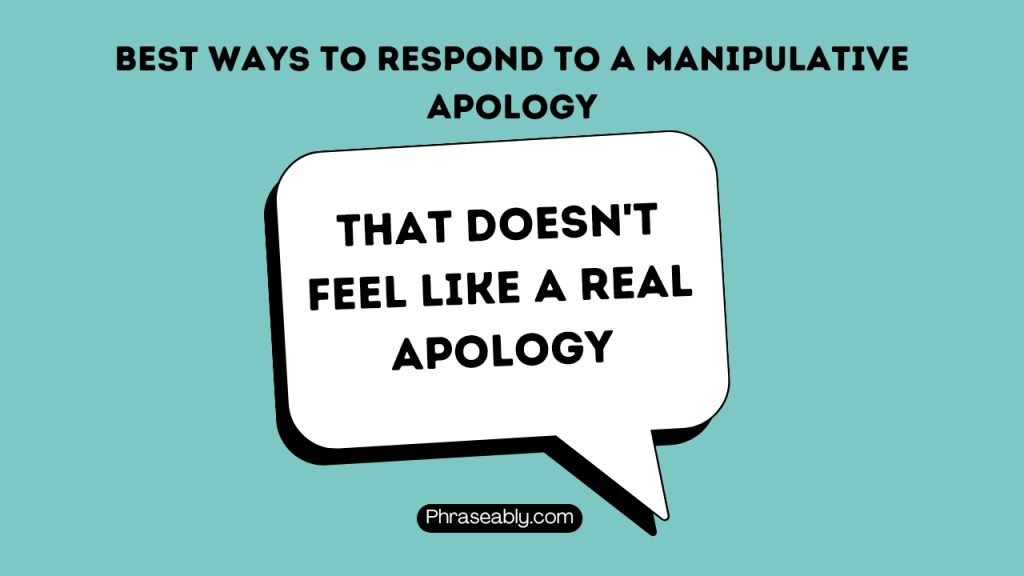
A powerful way to respond to a manipulative apology is to say, “That doesn’t seem like a genuine apology.”
Pointing out the issues with their apology clarifies your position and helps them understand where they went wrong.
You can now explain why you think their apology isn’t sincere and hasn’t resolved anything for you.
For example:
- I have heard you. You know what? That doesn’t feel like a real apology.
2. It seems like you’re just trying to make me feel guilty
If the person uses their apology to suggest that you’re being unreasonable or too sensitive, let them know.
Then, ask them to try apologizing again after learning how to give a more meaningful and effective apology.
For example:
- That’s not a proper apology, Daniel. it seems like you’re just trying to make me feel guilty.
3. I appreciate the apology, but it feels off
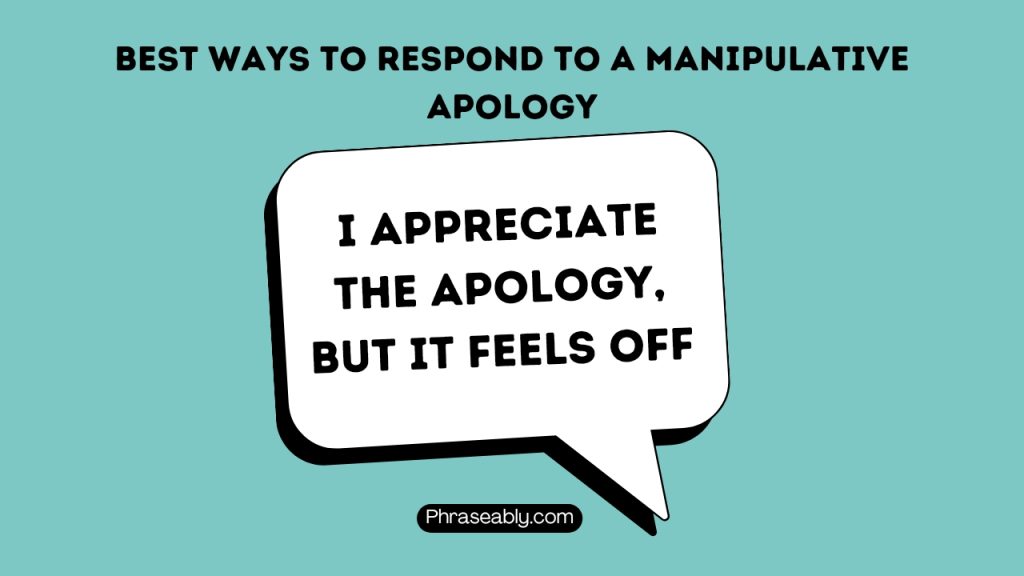
Another effective response to a fake apology is to thank them for the gesture of apologizing but let them know that the way they’ve phrased it doesn’t feel right to you.
When you start by acknowledging their effort, you show that you’re open to a sincere apology but expect them to take full responsibility and address the issue properly.
For example:
- I appreciate your apology, but it feels off. You need to admit what you did is wrong.
4. This sounds more like an excuse than an apology
Sometimes, people deliver apologies in a way that subtly shifts the blame onto you or makes excuses.
If you notice that they’re making you feel guilty or playing the victim, simply say, “This sounds more like an excuse than an apology.”
For example:
- I can see it in your eyes. This sounds more like an excuse than an apology
5. I need an apology without the strings attached
When you use a response like this, people will know your limits and what you expect from them. You can say this in different ways.
For example:
- I won’t accept that. I need an apology without the strings attached.
6. I’m not sure you’re actually sorry
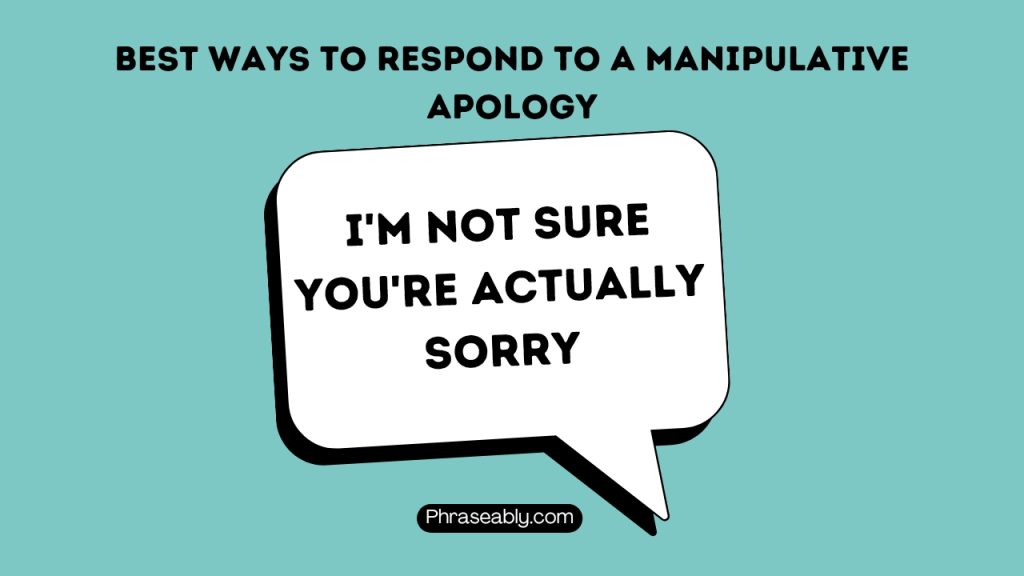
One characteristic of a manipulator is that when they give an apology, they can say heaven and earth, but you won’t be able to pinpoint the part when they genuinely admit their wrongdoing and feel sorry. That’s when this response is effective.
For example:
- You’ve said a lot in your apology, and I’m not sure you’re actually sorry.
7. Are you apologizing or just trying to shift blame?
Remember we said that unlike a sincere apology, the manipulator will apologize in a way that shifts the blame away from them so they can make you feel bad. You can respond to that kind of apology by calling it out.
For example:
- Are you listening to yourself? You’re shifting blame instead of apologizing.
8. I don’t think this is really about making things right
Another smart yet polite way to respond to a manipulative apology is to point out the loophole in it by saying it won’t even make things better because that’s just the reality.
For example:
- I don’t think this is really about making things right. You keep making the same mistakes. Back it up with actions!
9. It feels like you’re still defending your actions
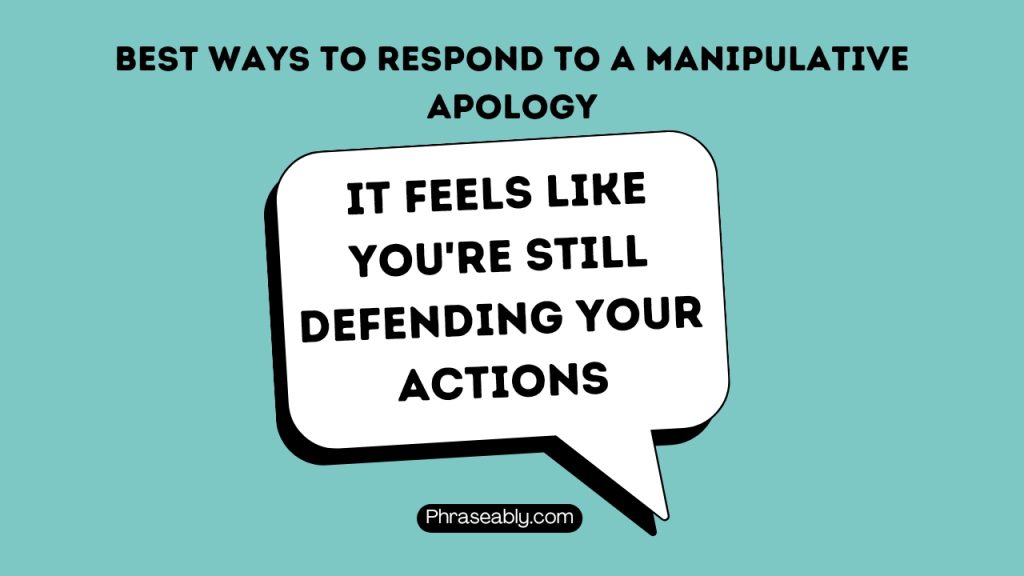
Instead of contemplating their apology and trying to see sense in it, don’t hesitate to call them out for defending their actions instead of being remorseful about it. There are many ways to use this response.
For example:
- You say you’re sorry, but it feels like you’re still defending your actions.
10. I’m not comfortable with how you’re apologizing
You’re not required to accept an apology and shouldn’t feel bad for rejecting an insincere attempt. If the apology makes you feel bad, be assertive about it.
For example:
- I know you feel sorry. What i don’t know is if you actually mean it. I’m not comfortable with how you’re apologizing.
11. That doesn’t address the real issue
One disadvantage of accepting a manipulative apology is that the main issue can be swept under the rug, and both of you can move on until they repeat the same problem again.
So it’s best to call it out.
For example:
- You may think your fake apology fools me, but we both know that it doesn’t address the main issue.
12. It feels like you’re trying to justify what happened
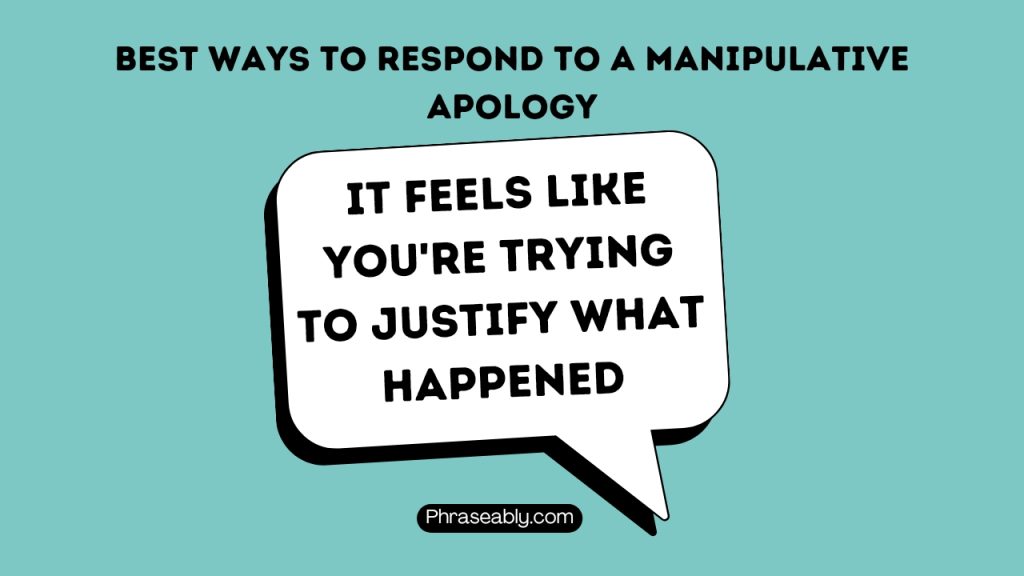
Another way you can quickly reply to an insincere apology is to let them know you’re aware of how they are intentionally justifying their actions under the pretext of apologizing. There are different ways to put it.
For example:
- It feels like you’re trying to justify what happened. This won’t be your last-minute bail-out card. Not this time.
13. I can’t accept this if it’s not sincere
Sometimes, all you need to say in reply when someone is giving you a fake apology is to reject it. Nothing more, nothing less. That’s why a reply like “I can’t accept this” will work any day anytime.
For example:
- Fake it all you want; I can’t and won’t accept this apology if it’s not sincere.
14. This seems more about you than about fixing things
Manipulators are usually self-centered, narcissistic and egoistic.
So when they give you a fake apology, you will see this reflected in the words. The best way to tackle them is to say it seems more of them than about solving the issue.
You can say it like this:
- I carefully listened to what you call an apology. It seems more about you than about fixing things.
15. I’m looking for an honest apology, not a twisted one
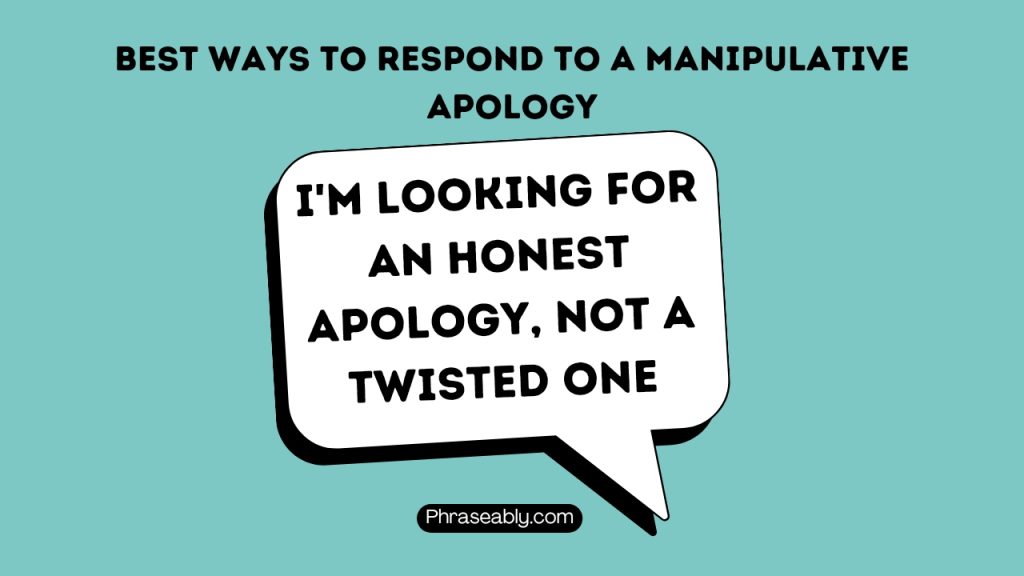
A genuine apology shows real remorse and a commitment to change. If you feel this is missing in their apology, let them know.
You don’t have to use the exact words, but make it clear that you expect more sincerity and a genuine effort to improve.
For instance, say:
- I won’t accept such a manipulative apology. Don’t give me something twisted. I’m looking for an honest apology.
16. I need you to own up to what you did, not make excuses
A major warning sign of a manipulative apology is when someone doesn’t take responsibility for their actions. As soon as you notice this, address it directly.
For example:
- That’s bullshit. I need you to own up to what you did, not make excuses
17. It sounds like you’re trying to manipulate the situation.
Alternatively, you can simply call out the manipulation directly. Be straightforward and let them know they’re being manipulative.
In a manipulative apology, the focus often shifts from the harm they caused to their feelings.
For example:
- You know you’re not being sincere. You’re trying to manipulate the situation.
18. Your apology doesn’t seem genuine
Don’t be suprise to find out later that the person is using that apology because they have exhausted all other options of making amends with you.
In such a case, you want to let them know that you don’t see their effort as a genuine one.
You could say something like:
- your apology doesn’t seem genuine, so I won’t accept it.
19. I want a real apology, not a half-hearted one
You may notice that the person only says they are sorry to end the argument without truly admitting to their wrongdoing. In that case, tell them you won’t accept such a half-hearted apology.
For example:
- If you think you can sweep this away with a half-hearted apology, then you must be dreaming. I want a real apology.
20. It feels like you’re just trying to make yourself feel better
Finally, every manipulative apology contains words or expressions centered on making the person feel better. So call them out once they try giving those excuses so they can own up to their actions.
With that in mind, a response like “it feels like you’re just truing to make yourself feel better” works well.
Why Is It Bad to Accept a Manipulative Apology?
Manipulative apologies often come with excuses, conditions, and blame-shifting. You don’t have to accept them; you can forgive someone on your terms.
If you decide to accept such apologies, here are some possible outcomes:
- You subconsciously start feeling responsible for their mistakes: If someone isn’t sincere in their apology and keeps apologizing, you may feel at fault for their actions.
- It allows them to repeat the mistakes now intentionally: If their apology isn’t genuine, they might not realize or care that their behavior is problematic and may continue making the same errors.
- Ultimately, the issue isn’t resolved between you two: Insincere apologies often mean that the real problem isn’t addressed. You and the person may move on without dealing with the underlying issue, which could lead to the same problem cropping up again.
To avoid these consequences, we recommend using one of the suggested responses to manipulative apologies discussed in this article.
Final Thoughts
Regardless of how you respond, don’t let a manipulative apology make you feel guilty or responsible for the other person’s actions.
Remember that a genuine apology will help you heal and rebuild trust, whereas a manipulative apology is just a tactic to control the situation.
So, take the time to determine if the apology is manipulative before you react.
Good luck!

